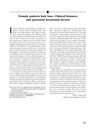Female Pattern Hair Loss
October 2002
in “
Journal of The American Academy of Dermatology
”

TLDR Use "female pattern hair loss" term, finasteride may help, more research needed.
The article discusses the importance of using the term "female pattern hair loss" instead of "androgenetic alopecia" when referring to women's hair loss, as only a small subset of women with central scalp pattern hair loss have signs of hyperandrogenism. The article also highlights the potential efficacy of finasteride, a 5a-reductase inhibitor, in treating women with early-onset female pattern hair loss and hyperandrogenemia, but notes that a large, well-controlled trial is needed to confirm this. The article suggests that current treatment options for female pattern hair loss are limited and that more research is needed in this area.











